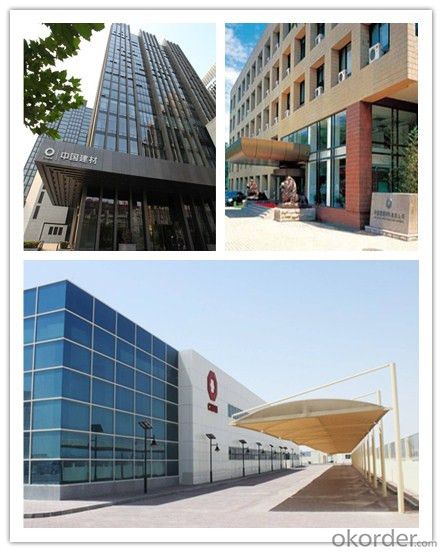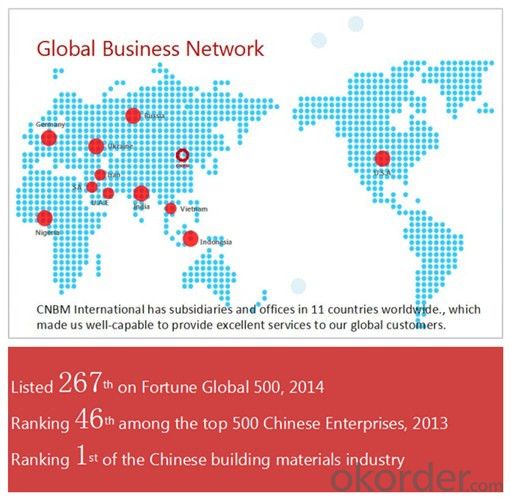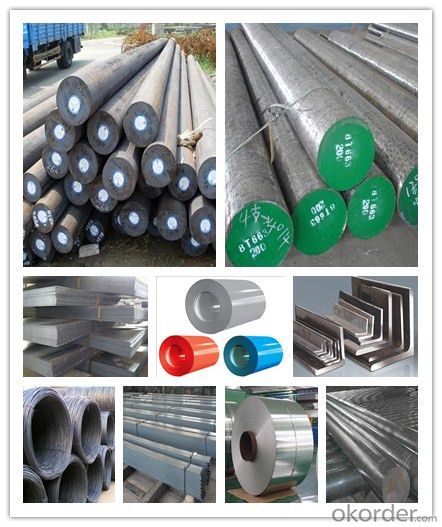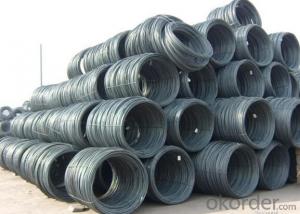5.5mm/6.5mm/8mm/10mm SAE1008/SAE1006/SAE1010 Wire Rod
- Loading Port:
- Tianjin
- Payment Terms:
- TT OR LC
- Min Order Qty:
- 10 m.t.
- Supply Capability:
- 10000 m.t./month
OKorder Service Pledge
OKorder Financial Service
You Might Also Like
Item specifice
5.5mm/6.5mm/8mm/10mm SAE1008/SAE1006/SAE1010 Wire Rod
Details of the 5.5mm/6.5mm/8mm/10mm SAE1008/SAE1006/SAE1010 Wire Rod
| Steel Grade | Q195-Q235,Q235,SAE 1008-1018 Hot Rolled Steel Wire Rod |
| Diameter | 5.5, 6.5, 7,8, 9,10, 12,14mm.etc. |
| Coil weight | 2m.t. |
| Application | drawing, construction materials, machinery parts,construction for Houses, Bridges, Roads,Packing |
| Deliver Time | 25-30 days after receipt of L/C or deposit by T/T |
| Packing | In coils, loading in container or by bulk vessel |
| Payment terms | 1).100% irrevocable L/C at sight. |
| 2).30% T/T prepaid and the balance against the copy of B/L. | |
| 3).30% T/T prepaid and the balance against L/C |
| Chemical Composition(%) | ||||||
| C | Mn | Si | S | P | Cr | |
| SAE1006B | 0.03~O.07 | ≤0.32 | ≤0.30 | ≤0.045 | ≤0.040 | 0.3-0.35 |
| Mechanical properties | ||||||
| Yield strength(N/mm2) | Tensile strength(N/mm2) | Elongation(%) | ||||
| 250-280 | 350-380 | ≥32 | ||||
| Grade | Chemical Composition(%) | |||||
| C | Mn | Si | S | P | Cr | |
| SAE1008B | 0.10max | 0.3~O.50 | 0.15max | 0.050max | 0.040 max | 0.3-0.35 |
| Mechanical properties | ||||||
| Yield strength(N/mm2) | Tensile strength(N/mm2) | Elongation(%) | ||||
| ≥195 | 315-430 | ≥30 | ||||
Supplier of the 5.5mm/6.5mm/8mm/10mm SAE1008/SAE1006/SAE1010 Wire Rod
CNBM International Corporation is the most import and export platform of CNBM group(China National Building Material Group Corporation) ,which is a state-owned enterprise, ranked in 270th of Fortune Global 500 in 2015.
With its advantages, CNBM International are mainly concentrate on Cement, Glass, Iron and Steel, Ceramics industries and devotes herself for supplying high quality series of refractories as well as technical consultancies and logistics solution.


Delivery of the 5.5mm/6.5mm/8mm/10mm SAE1008/SAE1006/SAE1010 Wire Rod
Packaging Detail | Sea worthy packing /as per customer's packing instruction |
Delivery Detail | 15 ~ 40 days after receiving the deposit |
Products Show

FAQ:
Are you a trading company or manufacturer? | Manufacturer |
What’s the MOQ? | 3 metric ton |
What’s your delivery time? | 15-35 days after downpayment received |
Do you Accept OEM service? | Yes |
what’s your delivery terms? | FOB/CFR/CIF |
What's the Payment Terms? | 30% as deposit,70% before shipment by T/T |
Western Union acceptable for small amount. | |
L/C acceptable for large amount. | |
Scrow ,Paybal,Alipay are also ok | |
Why choose us? | Chose happens because of quality, then price, We can give you both. Additionally, we can also offer professional products inquiry, products knowledge train (for agents), smooth goods delivery, excellent customer solution proposals. |
What's your available port of Shipment? | Main Port, China |
What’s your featured services? | Our service formula: good quality+ good price+ good service=customer's trust
|
Where are your Market? | Covering more than 160 countries in the world |
- Q:What are the properties of corrosion-resistant tool steel?
- Corrosion-resistant tool steel possesses several key properties. Firstly, it exhibits excellent resistance to corrosion, which prevents the formation of rust and other forms of deterioration. Additionally, it maintains its strength and hardness even in harsh environments, making it highly durable and long-lasting. This type of tool steel also demonstrates good wear resistance, minimizing the risk of abrasion and extending its lifespan. Finally, corrosion-resistant tool steel can be easily machined and formed, allowing for precise manufacturing processes.
- Q:What are the challenges in heat treating special steel?
- Some of the challenges in heat treating special steel include achieving the desired hardness and strength while maintaining dimensional stability, avoiding distortion or warping, controlling grain growth and microstructure, and ensuring proper heat distribution and uniformity throughout the material. Additionally, special steel alloys may have unique properties that require specific heat treatment techniques or specialized equipment, adding complexity to the process.
- Q:Can special steel be used in the power transmission industry?
- Yes, special steel can be used in the power transmission industry. Special steel alloys, such as high-strength and corrosion-resistant varieties, are often used to manufacture components like gears, shafts, and bearings in power transmission systems. These special steels offer improved durability, increased load capacity, and better resistance to wear and fatigue, making them suitable for the demanding conditions of the power transmission industry.
- Q:What are the different methods of preventing intergranular corrosion in special steel?
- Various techniques are available for preventing intergranular corrosion in special steel. 1. Heat Treatment: A highly effective approach involves subjecting the steel to solution annealing, a heat treatment process. This method entails heating the steel to a high temperature and rapidly cooling it. By doing so, any precipitates or carbides that may have formed along the grain boundaries are dissolved, thereby reducing the risk of intergranular corrosion. 2. Alloying: Another strategy is to introduce specific alloying elements into the steel composition. For instance, the addition of elements such as chromium and molybdenum can enhance the steel's resistance to intergranular corrosion. These alloying elements create a protective oxide layer on the surface, preventing corrosion along the grain boundaries. 3. Passivation: Passivation involves treating the steel surface with chemicals that establish a protective layer. This layer acts as a barrier, safeguarding the grain boundaries from the corrosive environment. Common passivation techniques include acid pickling and electrochemical methods. 4. Sensitization Control: Particular attention must be given to controlling the sensitization process. Sensitization occurs when the steel is exposed to high temperatures for an extended period, resulting in the precipitation of chromium carbides along the grain boundaries and rendering the steel vulnerable to intergranular corrosion. By carefully controlling the heating and cooling rates during processing, sensitization can be minimized or prevented. 5. Corrosion Inhibitors: Another option is the utilization of corrosion inhibitors, which are chemicals that can be applied to the steel surface to protect it from corrosion. These inhibitors form a protective film on the surface, preventing corrosive agents from attacking the grain boundaries. It is important to consider that the choice of method depends on the specific type of special steel and its intended application. Selecting the most suitable approach requires a comprehensive understanding of the steel's composition, processing conditions, and the expected corrosive environment.
- Q:How does special steel contribute to sustainable construction?
- Special steel contributes to sustainable construction in several ways. Firstly, it has high strength and durability, which allows for the design and construction of lighter and more efficient structures. This reduces the amount of material needed and saves resources. Secondly, special steel is often made from recycled materials, reducing the demand for virgin resources and minimizing environmental impact. Additionally, special steel can be easily recycled at the end of its life cycle, promoting a circular economy and reducing waste. Overall, special steel helps to create sustainable buildings by improving energy efficiency, reducing carbon emissions, and conserving resources.
- Q:How does special steel contribute to the transportation industry?
- Special steel contributes to the transportation industry by providing high-strength, lightweight, and corrosion-resistant materials for various applications. It is used in the manufacturing of automobile bodies, engine components, and structural parts, enabling vehicles to be more energy-efficient, durable, and safe. Additionally, special steel is utilized in the production of aircraft parts, railway tracks, and shipbuilding, enhancing the performance, reliability, and longevity of these modes of transportation.
- Q:Can special steel be used in the semiconductor manufacturing industry?
- Yes, special steel can be used in the semiconductor manufacturing industry. Special steel, such as stainless steel or tool steel, is commonly employed in various applications within the semiconductor industry. It is used for making equipment and components that require high levels of cleanliness, corrosion resistance, and precision. Special steel alloys are often utilized in the fabrication of semiconductor processing tools, vacuum chambers, wafer carriers, and other critical parts to ensure optimal performance and reliability in the manufacturing process.
- Q:How does special steel perform in automotive applications?
- Special steel is often used in automotive applications due to its exceptional performance characteristics. It offers superior strength, durability, and resistance to wear and corrosion, making it an ideal choice for various automotive components. In terms of strength, special steel has a higher tensile strength compared to regular steel, allowing it to withstand heavy loads and impacts. This strength is crucial in automotive applications where components need to endure extreme forces and maintain structural integrity. Special steel also exhibits excellent fatigue resistance, ensuring longevity and reliability in demanding conditions. Moreover, special steel's exceptional durability enables it to withstand harsh environments, such as extreme temperatures, chemicals, and moisture. This durability helps automotive components to maintain their functionality and performance over an extended period. Another significant advantage of special steel in automotive applications is its resistance to wear and corrosion. Automotive components are constantly exposed to friction, abrasion, and corrosive substances. Special steel's high wear resistance allows these components to endure prolonged use without significant degradation. Furthermore, its corrosion resistance protects against rust and other forms of deterioration, preventing premature component failure. Additionally, special steel can be easily shaped and formed into complex designs, enabling automotive manufacturers to create intricate components with precise specifications. This versatility and formability of special steel make it an excellent choice for various automotive applications, including engine parts, suspension systems, chassis components, and exhaust systems. Overall, special steel's exceptional strength, durability, resistance to wear and corrosion, and versatility make it a highly desirable material for automotive applications. Its performance characteristics contribute to improved safety, reliability, and efficiency in vehicles, making special steel an integral part of the automotive industry.
- Q:What are the different nitriding techniques used for special steel?
- There are several nitriding techniques used for special steel, including gas nitriding, salt bath nitriding, plasma nitriding, and ion nitriding. Each technique involves introducing nitrogen into the surface of the steel to improve its hardness, wear resistance, and corrosion resistance. Gas nitriding involves exposing the steel to ammonia gas at high temperatures, while salt bath nitriding immerses the steel in a bath of molten salts containing nitrogen. Plasma nitriding and ion nitriding both use electrical discharges to ionize nitrogen gas and accelerate it towards the steel surface. These techniques offer different levels of control over the nitriding process and can be tailored to meet specific requirements for different types of special steel applications.
- Q:How does special steel contribute to improving product reliability in critical applications?
- Special steel contributes to improving product reliability in critical applications by offering enhanced characteristics such as high strength, durability, corrosion resistance, and heat resistance. These properties make special steel ideal for withstanding extreme conditions and heavy loads, ensuring the stability and performance of critical applications. Additionally, special steel alloys can be tailored to specific application requirements, providing a custom solution that meets the unique demands of various industries. This helps to minimize the risk of failures, increase the lifespan of products, and enhance overall reliability, ultimately contributing to the safety and efficiency of critical applications.
1. Manufacturer Overview |
|
|---|---|
| Location | |
| Year Established | |
| Annual Output Value | |
| Main Markets | |
| Company Certifications | |
2. Manufacturer Certificates |
|
|---|---|
| a) Certification Name | |
| Range | |
| Reference | |
| Validity Period | |
3. Manufacturer Capability |
|
|---|---|
| a)Trade Capacity | |
| Nearest Port | |
| Export Percentage | |
| No.of Employees in Trade Department | |
| Language Spoken: | |
| b)Factory Information | |
| Factory Size: | |
| No. of Production Lines | |
| Contract Manufacturing | |
| Product Price Range | |
Send your message to us
5.5mm/6.5mm/8mm/10mm SAE1008/SAE1006/SAE1010 Wire Rod
- Loading Port:
- Tianjin
- Payment Terms:
- TT OR LC
- Min Order Qty:
- 10 m.t.
- Supply Capability:
- 10000 m.t./month
OKorder Service Pledge
OKorder Financial Service
Similar products
New products
Hot products
Related keywords
































